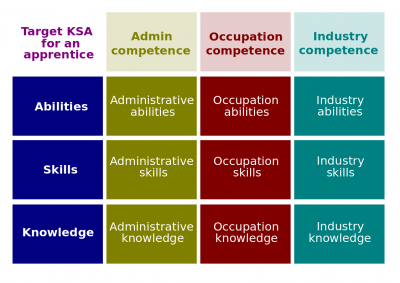Difference between revisions of "Educational Credentials"
(→Script) |
(→Script) |
||
| Line 12: | Line 12: | ||
===Script=== | ===Script=== | ||
| − | :An [[educational credential]] is a [[credential]] that confirms one's [[education]] | + | :An [[educational credential]] is a [[credential]] that confirms one's [[education]]. |
| − | :[[ | + | :[[Educational institution]]s mostly award [[academic credential]]s. |
| − | :[[ | + | :However, some [[educational institution]]s offer educational programs that combine credentialing of academic achievements and professional experience. |
| + | |||
| + | :These advanced programs commonly are in creative arts and the medical field, but they may include other [[course of study|courses of study]]. The credentials awarded from these programs can be [[professional degree]]s. | ||
| + | |||
| + | :''Professional degrees'' prepare to work in a particular profession, often meeting the academic requirements for licensure or accreditation. | ||
| + | |||
| + | :In the [[United States]], [[apprenticeship]] that is registered and overseen by a government organization is known as [[registered apprenticeship]]. In some states, this organization is the [[United States Department of Labor]]; similar state bodies register and oversee [[registered apprenticeship]]s in the other states. Those organizations issue [[educational credential]]s to the graduates from the [[registered apprenticeship]]s. | ||
'''[[Academic Credentials]]''' is the successor [[lectio]]. | '''[[Academic Credentials]]''' is the successor [[lectio]]. | ||
Revision as of 01:45, 12 May 2020
Educational Credentials (hereinafter, the Lectio) is the second lesson part of the Certifications of Study lesson that introduces its participants to educational credentials and related topics.
This lesson belongs to the Introduction to Education session of the CNM Cyber Orientation. The Orientation is the second stage of the WorldOpp Pipeline.
Contents
Content
The predecessor lectio is Learning Arrangements.
Key terms
- Educational credential. A credential that confirms one's education. Some educational institutions offer educational programs especially in creative arts and the medical field that combine credentialing of academic achievements and professional experience.
- Registered apprenticeship. In the United States, apprenticeship that is registered and overseen by a government organization. In some states, this organization is the United States Department of Labor; similar state bodies register and oversee registered apprenticeships in the other states. Those organizations issue educational credentials to the graduates from the registered apprenticeships.
Script
- An educational credential is a credential that confirms one's education.
- Educational institutions mostly award academic credentials.
- However, some educational institutions offer educational programs that combine credentialing of academic achievements and professional experience.
- These advanced programs commonly are in creative arts and the medical field, but they may include other courses of study. The credentials awarded from these programs can be professional degrees.
- Professional degrees prepare to work in a particular profession, often meeting the academic requirements for licensure or accreditation.
- In the United States, apprenticeship that is registered and overseen by a government organization is known as registered apprenticeship. In some states, this organization is the United States Department of Labor; similar state bodies register and oversee registered apprenticeships in the other states. Those organizations issue educational credentials to the graduates from the registered apprenticeships.
Academic Credentials is the successor lectio.
Quiz
- Every statement below is split into one true and one false question in the actual exam.
- A high school diploma and professional degree are (not) examples of academic credential.
- All academic credentials are (not) educational ones.
- All educational credentials are (not) academic ones.
- One can (not) land a good job without a high-school diploma.
- One can (not) land a good job without an academic credential.
- Graduating from university rather from an apprenticeship leads (does not necessarily lead) to a better job.
- With regard to fast employment, schools and universities do (not) tend to be better than apprenticeship.
- Graduating from apprenticeship rather from an university leads (does not necessarily lead) to a better job.
- With regard to fast employment, apprenticeship does (not) tend to be better than schools and universities.

